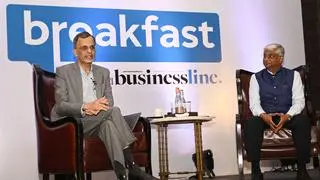Coming out in support of the India government’s decision to demonetise high value currency notes, Paris-based Organisation for Economic Cooperation and Development (OECD) said the move will lead to financing of the economy and higher tax compliance.
“Demonetisation is a very short-term mechanism with visible effects. India will never be the same again post demonetisation,” said OECD Secretary General Angel Gurria. He was speaking here on Tuesday after jointly launching the OECD Economic Survey of India with Economic Affairs Secretary Shaktikanta Das.
The note-ban will help the country move to a less cash society and facilitate greater financial penetration and better consumer protection, he said. Its impact may be felt on the consumption pattern in a quarter, but it is going to “bite” in the medium and long term, he added. “This will not affect investment or jobs.”
However, in its survey, OECD has lowered India’s real GDP growth forecast to 7 per cent in the current fiscal, from its earlier estimate of 7.4 per cent. In FY18 and FY19, it expects the economy to grow at 7.3 per cent and 7.7 per cent respectively.
Shaktikanta Das said the benefits and outcomes of demonetisation will be evident in the coming quarters, starting April. “The impact of demonetisation was mostly on consumption and that was temporary. Long-term and medium-term, from the next quarter onwards, the benefits and outcomes are going to be very positive,” he said, adding that remonetisation is now almost complete.
Gurria termed India as one of the top reformers amongst G-20 countries but stressed that the reform momentum must continue for more inclusive growth. “India has been a star performer in gloomy times. We do not have many cases of 7 per cent growth,” he said.
The report also identified priority areas for future action, including continuing plans to maintain macroeconomic stability and further reduce poverty, additional comprehensive tax reforms and new efforts to boost productivity and reduce disparities between India’s various regions.
Gurria also called for implementation of the GST as soon as possible, as it will spur competitiveness and investment, making India one market. The government is targeting July 1 for the rollout of the indirect tax reform.
“By reducing tax cascading, it will support the manufacturing sector and investment. It is, however, designed to be revenue neutral and does not provide an avenue for raising more revenue, at least in the medium term,” the report noted.
It also advocated a “comprehensive reform” of property, personal income and corporate taxes to complement the GST reform.
Statutory rates Noting that less than 6 per cent of the population pays personal income tax, Gurria suggested that the government should raise more revenues from property taxes and personal income tax.
“There should be fewer exemption and more statutory rates,” he said, adding that the benefits of tax reliefs to housing sector are availed of mostly by those who are well off.
The report recommended that India cut the corporate tax rate to 25 per cent, introduce inheritance tax and provide certainty in rules.
Meanwhile, the OECD and the Confederation of Indian Industries also signed an MoU to cooperate and work on areas of common interest such as economic, social, governance and environmental policy.








Comments
Comments have to be in English, and in full sentences. They cannot be abusive or personal. Please abide by our community guidelines for posting your comments.
We have migrated to a new commenting platform. If you are already a registered user of TheHindu Businessline and logged in, you may continue to engage with our articles. If you do not have an account please register and login to post comments. Users can access their older comments by logging into their accounts on Vuukle.